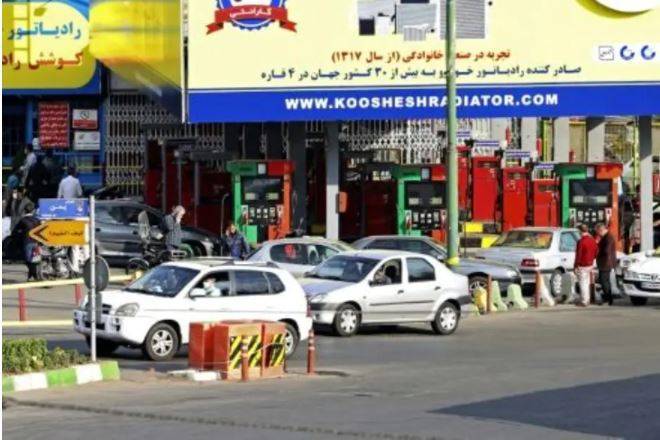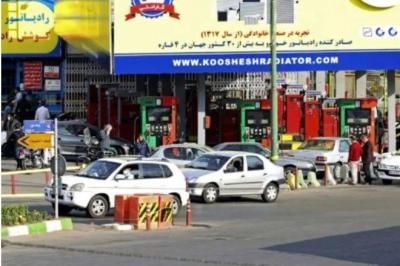A "widespread cyber attack" on Tuesday caused disruptions at fuel distribution stations across various parts of Iran, according to official sources, although authorities have not yet identified those responsible. The outage began around noon local time (08:30 GMT) and continued into the early hours of the evening, marking one of the most significant cyber attacks against the Islamic Republic in years. State television reported that the Supreme National Security Council stated that the malfunction was caused by a "cyber attack on the fuel distribution information system," noting that "the details of the attack and its origin are under investigation."
The television reported that the disruption affected the electronic card systems used for fuel dispensing at the stations, initially indicating "a failure in the information system." Sources cited by the channel, who were not named, "did not rule out" that the cyber attack was the cause of the disruption, later confirming this.
Cars and motorcycles lined up outside fuel stations in Tehran, according to reporters from the Agence France-Presse. The television broadcast footage of closed stations with lines of vehicles nearby. The halt in fuel distribution at these stations astonished drivers and bikers in a country known for its vast oil wealth, which provides its derivatives at subsidized low prices. A woman, who preferred not to be named while waiting near a filling station, told AFP, "I don't want to talk; I am in a bad mood."
The attack disrupted the smart system designed to operate the pumps at the stations, which uses electronic cards. These cards allow holders to receive a monthly quota of subsidized fuel, with the cost of the fuel—whether subsidized or at the normal price—paid via bank cards. Users on social media complained about having to refrain from driving their cars today due to fuel shortages.
### "Emergency Meeting"
The Islamic Republic is rich in energy resources. According to a report by the International Energy Agency, Iran ranks third globally in terms of proven oil reserves and was fifth among OPEC oil-exporting countries in 2020, noting that U.S. sanctions significantly impact Iranian oil exports. The Iranian oil distribution company quickly sought solutions to operate the stations while awaiting the return of the electronic distribution system.
Company spokesperson Fatemeh Kahi reported an "emergency meeting to solve the problem" in statements to state television. The state channel later stated that technicians from the Ministry of Oil had begun disconnecting the electronic system at some stations to allow them to resume fuel supply while awaiting a technical solution.
In recent years, Iran has been a target of numerous cyber attack attempts. In May 2020, the Washington Post reported that Israel, the Islamic Republic's fierce regional adversary, was behind a cyber attack that targeted one of the ports in Bandar Abbas in southern Iran, in retaliation for what the newspaper claimed was an Iranian cyber attack on Israeli civilian hydraulic facilities. In February of the same year, the Iranian Ministry of Communications announced it had successfully thwarted a cyber attack aimed at internet service providers that caused disruption in network connectivity for about an hour.
In late 2019, Tehran announced that government sites were subjected to a "highly organized" attack. Communications Minister Mohammad Javad Azari Jahromi confirmed at the time that the authorities "identified and thwarted" the cyber threat without revealing the identity of the attackers or the targeted sectors. One of the most notable cyber attacks on Iran dates back to September 2010, when the Stuxnet virus targeted facilities associated with its nuclear program, causing a series of malfunctions in centrifuge devices used for uranium enrichment. Iran accused the United States and Israel of being behind the attack, and several experts in the field of cybersecurity alleged that U.S. and Israeli intelligence agencies orchestrated it.
### Possible Connection to 2019?
Furthermore, the conservative-aligned Fars news agency hinted that the timing of today's attack may be related to the upcoming anniversary of widespread protests that erupted in the Islamic Republic in mid-November 2019, sparked by a decision to raise fuel prices amid a severe economic crisis. During these incidents, which were met with severity from security forces and labeled by the government as "riots" orchestrated by foreign "enemies," gas stations and banks were set on fire, police stations were attacked, and commercial stores were looted. Internet connectivity was cut off for nearly a week. After months of withholding casualty figures, the Iranian authorities announced that 230 people were killed during these violent events. Independent experts working for the United Nations estimated that the death toll could exceed 400. Interior Minister Ahmad Vahidi sought to reassure Iranians, emphasizing in statements reported by state television that the government "has no plan to raise fuel prices and that people should not worry."




